Every day, millions of consumers use Google to find restaurants, cafes, pharmacies, supermarkets, gas stations, clothing stores, clinics, and more. In Brazil, it's estimated that searches for local businesses account for half of all daily Google searches 2025 edition Local Decision survey an initiative by Harmo in partnership with Reclame AQUI, aims to understand the influence that reviews have on the choice of physical store when consumers search on Google or Google Maps.
The survey results confirm that publicly shared reviews on Google are firmly embedded in the new omnichannel journey , especially when consumers want to make a purchase in a physical store. When making a purchase, the store with the best reputation—that is, the best-rated—has an advantage and attracts more customers.
Another point worth highlighting is the confirmation of the relevance of Google Business Profile (popularly known as GMB or Google My Business ) as a tool for attracting customers, from online to physical stores. Managing your store's GMB profile is essential for those in commerce, retail, and service. Those who aren't there are left out of the customer journey.

The survey was carried out between January 6th and 10th, 2025, and had the participation of 1,591 Reclame AQUI users , guaranteeing a relevant sample that guarantees the veracity of the results presented.
What is the factor that most influences your decision when choosing a store on Google or Google Maps?
The first question seeks to understand which are the three factors that most influence the decision to choose a store , based on search results on Google or Google Maps.
For 40% of consumers, the number of reviews is the most important factor. The rating (from 1 to 5 stars) comes in second for 39% of consumers surveyed. For 35% of respondents, having complete information on the company's Google profile is the third most important factor in choosing a location.
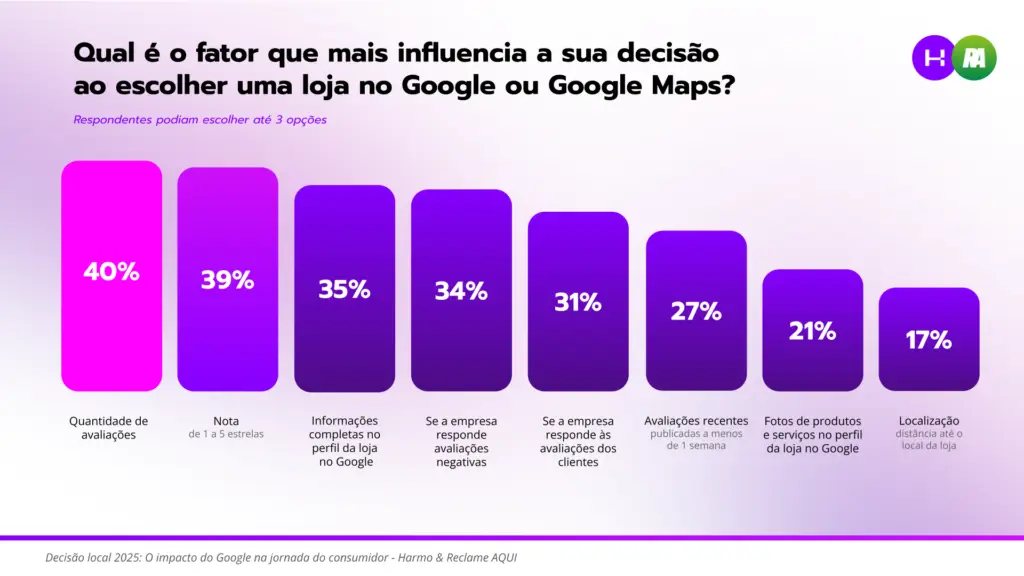
High ratings and a large number of reviews indicate which stores are the best , in the opinion of their own customers. Stores that lack sufficient social proof are discarded, and only the best continue in the selection process.
PwC study shows that 73% of consumers consider experience to be the deciding factor when choosing a brand – often even more so than price ($) or convenience.
Reputation is more important than location
Between 2022 and 2025, the importance of location when choosing a store has dropped dramatically.
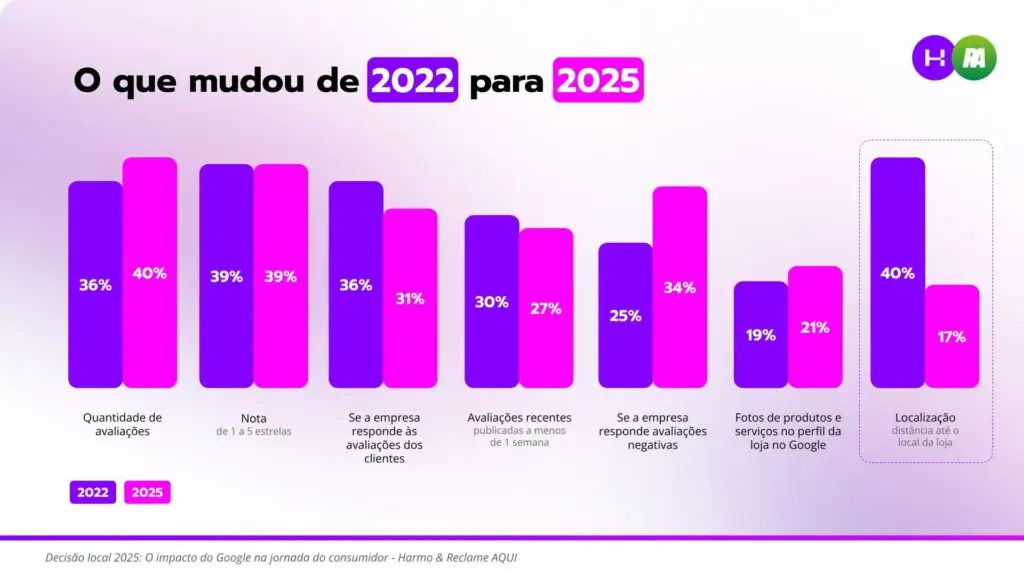
In 2022, 40% of consumers considered location to be the most relevant factor in choosing a store, but this number fell to just 17% in 2025, ranking last among all factors analyzed.
In 2025, we also found that the number of reviews surpassed the importance of the rating, which remains very important, but only when accompanied by a number of reviews that inspire trust. A high rating with a low number of reviews doesn't help attract customers.
The factor that grew most in importance from 2022 to 2025 is whether the company responds to negative reviews, rising from 25% to 34%.
This means that, before choosing a store, the consumer wants to know how they will be treated by the company , in the event of a negative experience.
This shows that consumers are willing to travel further afield as long as the experience is better. In other words, consumers seek experience regardless of location.
Do you read customer reviews before choosing a store?
Before choosing a store, 96% of consumers read Google reviews, making the customer's voice a decisive factor in the purchasing journey.
The vast majority, 70%, read both positive and negative reviews to form their opinion of the store. Another 13% of respondents read mainly positive reviews and 13% read mainly negative reviews.
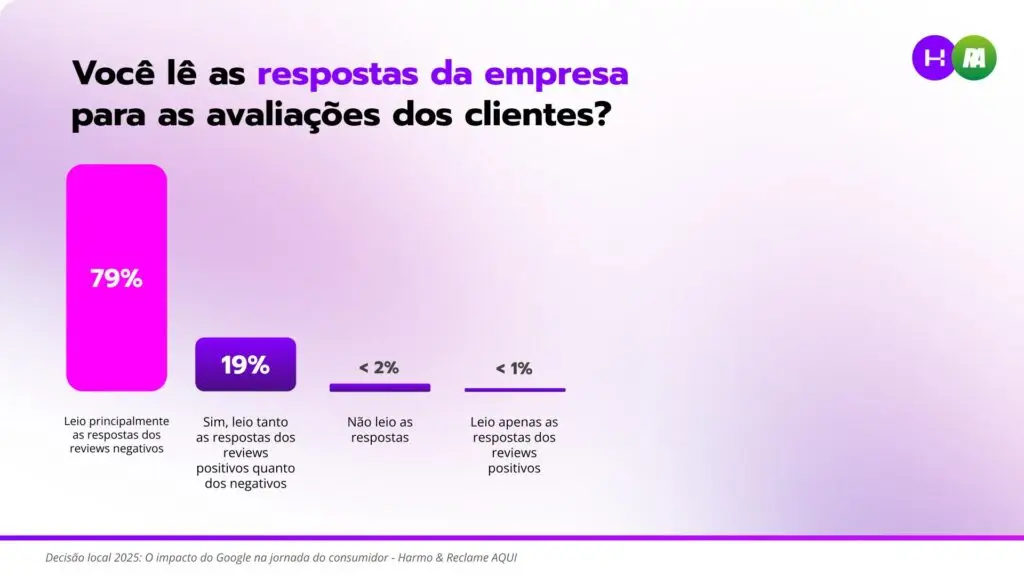
Reviews shared on Google have a huge influence on a store's choice and have become an essential part of the journey that takes consumers from online to physical stores .
Consumers want to know what customers are praising, what stood out in their experience, and how the company treated customers who had a negative experience.
According to Edelman , 81% of consumers only buy from a brand when they trust it. Reviews serve precisely this purpose: to help consumers decide which store they can trust most.

How many reviews do you usually read before making an online purchasing decision?
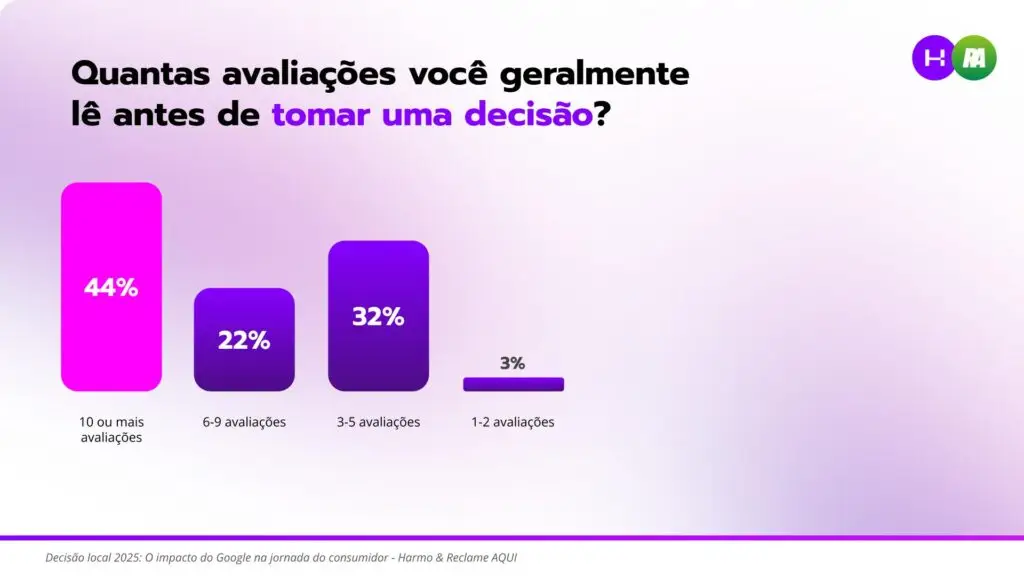
Consumers are discerning when choosing a store
To ensure they're making the right decision, 44% of consumers read 10 or more reviews before choosing a store. And, as we saw earlier, consumers read both positive and negative reviews, demonstrating that they're very discerning .
This reinforces the need for stores to gain reviews daily , as consumers will give preference to stores that allow them to be analyzed more carefully.
Of the 96% of consumers who read reviews, only 3% read 1-2 before choosing a store . Another 32% read 3-5 reviews, and 22% read 6-9 reviews.
Considering that, for 27% of consumers, one of the 3 most important factors when choosing a store is related to the date of the reviews, which cannot be more than a week old from the date of publication, we reached the following conclusion:
For companies, this data reinforces Google My Business as a strategic customer acquisition channel . The greater the number of reviews, the greater the consumer confidence and, consequently, the higher the conversion rate. Active review management—encouraging feedback, responding to interactions, and ensuring a continuous flow of new reviews—becomes a key competitive differentiator.
The store that receives the most reviews, regularly and frequently, increases the likelihood of being the store chosen by the consumer.
Do you read the company's responses to customer reviews?

Consumers not only read reviews before deciding on a store, but they also consider the companies' responses to their customers in their analysis.
The vast majority, 79%, primarily read the responses to negative reviews, which makes a lot of sense, since this is precisely the factor that grew the most in relevance, from 2022 to 2025, when choosing a store.
Consumers know that companies aren't infallible and that problems can happen. But when they do, they want to know how they'll be treated by the company . This fact greatly increases the importance not only of responding, but also how to respond .
On the other hand, companies that don't respond to Google reviews lose relevance and customers to companies that do.
45% of consumers prefer to buy from companies that respond to negative reviews, according to research by Review Trackers.
Responding to reviews is a huge challenge for companies, but also an excellent opportunity to show how much they care and are attentive to their customers' opinions.
Do companies' responses to customer reviews influence your decision?
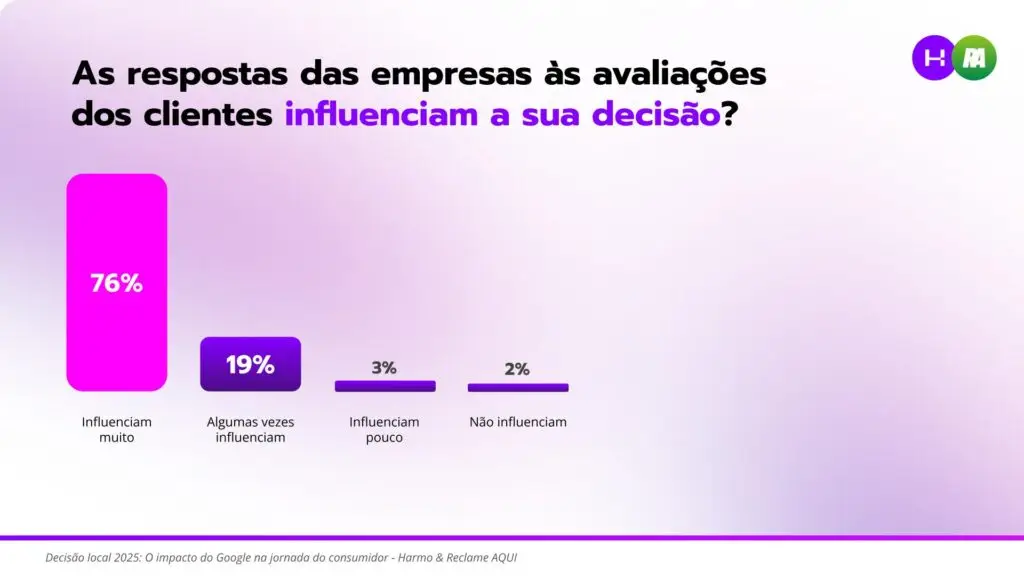
In addition to responding to reviews, companies need to consider the quality of their responses, as 76% of consumers believe that company responses greatly influence their choice of store.
Consumers are opting for companies that interact with and thank their customers for the reviews they receive, whether positive or negative, with only 2% of consumers not being influenced by company responses.
It's crucial to consider that thousands of consumers will read company responses every day, directly influencing their decisions. Therefore, you shouldn't just respond to the customer who left the review, but to the thousands of potential customers who will read the response before making a decision.
The more personalized the response, the more trust consumers will feel toward a store. A poorly written response can cause significant damage and drive away thousands of potential customers.
What is the lowest rating a company can have to be considered trustworthy?
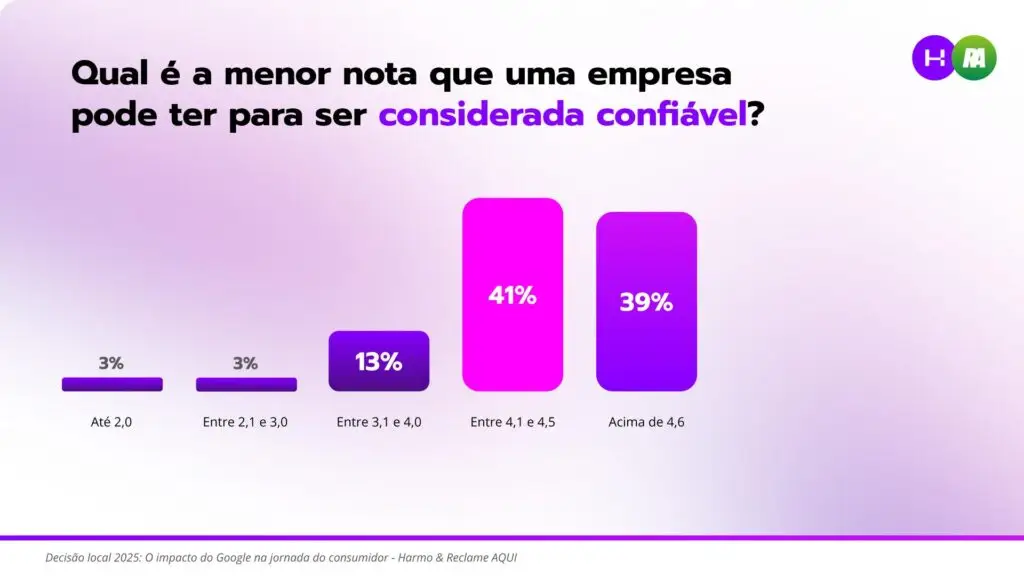
The rating is the second most important factor when choosing a store, second only to the number of reviews.
For 41% of consumers, the minimum rating a store can have on Google is 4.1 stars . Below that, it's unlikely to be considered as one of the options, much less chosen.
But for 39% of consumers, the minimum rating needs to be 4.6 stars, a really high rating that requires companies to pay extra attention to managing their reputation on Google .
With so many options when choosing a store, consumers avoid choosing stores with ratings below 4 stars. A negative reputation on Google is a major obstacle to attracting customers from online to offline.
87% of people would not consider choosing and buying from a store with less than 3 stars, according to research by Brightlocal.

Have you ever stopped choosing a store after reading negative reviews about it on Google?
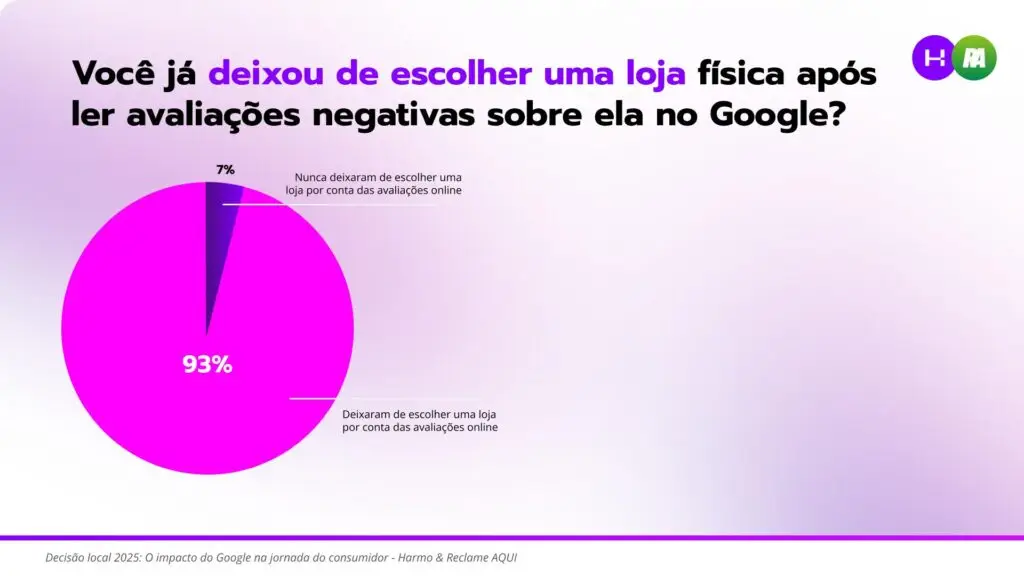
93% of consumers have stopped going to a store after reading negative reviews about it on Google , reinforcing the importance of online reputation management as a customer acquisition strategy.
Considering that 76% of consumers interviewed in the survey confirmed that companies' responses influence their decisions when choosing a store, we bring here a point for reflection: the power of a well-crafted response to a negative review .
To choose a store, consumers need to answer the following question in their mind: which one inspires the most trust? The answer comes from the stores' own customers, who share their experiences publicly through reviews.
In a survey conducted by Review Trackers, the answer to this same question yielded practically the same result: 94% of consumers stated that they had stopped choosing a store after reading negative reviews about it.
Do you rate companies on Google?
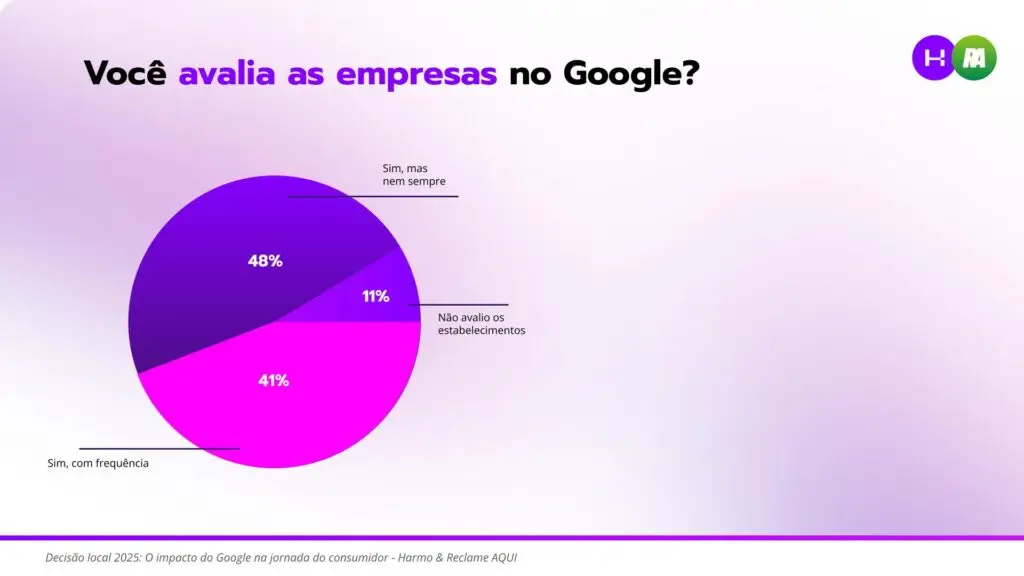
Consumers have discovered that they can help each other make better purchasing decisions and have come to trust the reviews they share daily on Google.
This makes reviews extremely important in the purchasing journey, so much so that 41% of respondents said they frequently review companies, and another 48% do, but not always. Only 11% of respondents said they don't review .
However, let's remember that, when deciding on a store, 97% of respondents say they read Google reviews to decide which store will receive their visit and their money.
Therefore, to increase sales, companies rely on customer reviews. Without reviews, consumers can't know whether a company will meet their expectations and whether they can trust it. So they'll look for another company until they find one they feel more confident choosing.
Why do you think it's important to evaluate a company on Google?
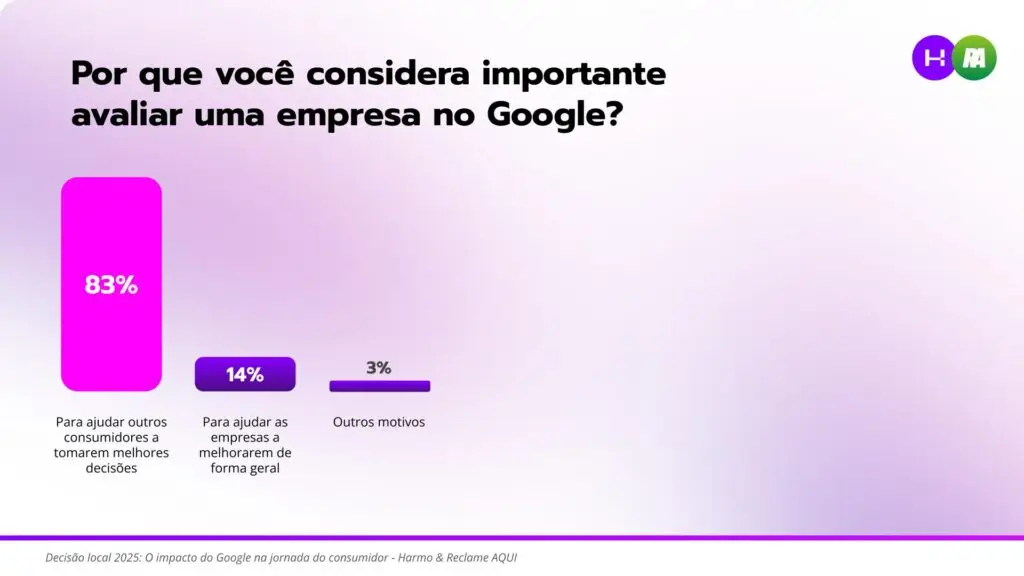
This question is probably the most important in the survey, as it highlights the consumer's true intention when evaluating a store on Google: to help other consumers make better decisions .
It's with this goal in mind that 83% of customers rate businesses on Google . Consumers want to know from the businesses' own customers whether they can trust the company, whether they'll have a good experience, and whether their expectations will be met.
Only 14% of consumers rate companies to help them improve . In other words, when consumers rate a company, they're not talking to it, but to each other.
Consumers have created a constant cycle where the current customer directly influences the future customer's decision .
This is why many companies respond incorrectly to reviews, thinking customers are talking to them when, in fact, they're not. And that changes everything.
When you evaluate companies, what is your most common approach?
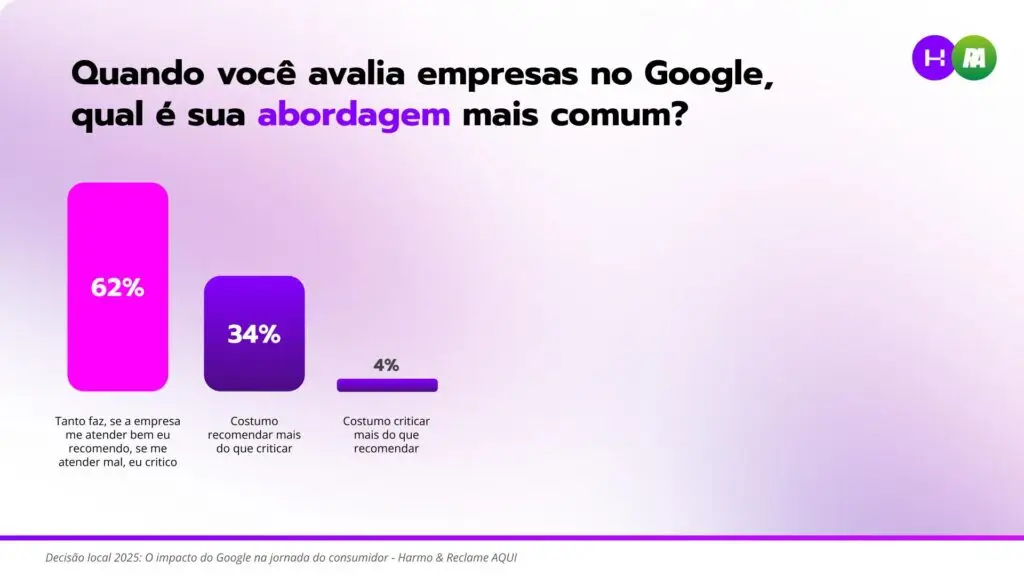
The survey data definitively debunks the myth that customers prefer to complain more than praise when evaluating companies on Google, as 62% of consumers responded that they evaluate companies both positively and negatively , depending entirely on the service they received.
Another 34% tend to recommend more than they criticize and only 4% tend to criticize more than they recommend .
Companies that serve their customers well shouldn't be afraid to ask for reviews. However, you should never offer discounts or perks to receive positive reviews. Good service is the key and the only way to achieve this.
Companies also don't need to fear negative reviews. Quite the contrary, a negative review is an opportunity for a company to join the conversation and demonstrate how it treats its customers through a sincere response that aligns with the purpose of reviews: helping consumers make better decisions.
Businesses that serve their customers well shouldn't be afraid to ask for reviews. But be careful: never offer discounts or perks to receive positive reviews. Always comply with Google's policies to avoid problems.
In which business segments are evaluations decisive in your choice?
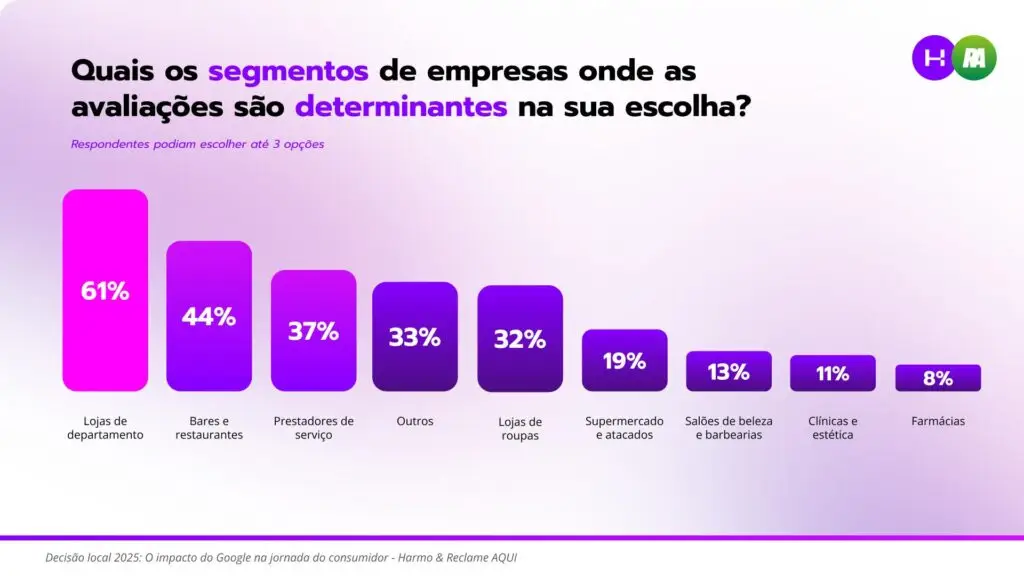
Department stores are the segment where reviews are the most decisive factor in choosing a store , according to 61% of the more than 1,500 consumers who responded to the survey.
In fact, this segment receives a very high number of reviews and it is normal to find stores with more than 3-4 thousand reviews on Google.
44% of consumers understand that reviews of bars and restaurants are essential for making their choice.
For 37% of respondents, service providers are among the three segments where reviews have a major influence on their decisions, followed by clothing stores, with 32% , a surprising result, given that this segment does not usually receive many reviews from its customers.
Pharmacies ranked last, with 8% of respondents selecting this segment as one of the three most reliant on reviews when choosing a store. In this segment, reviews tend to be more negative than positive, and the number is generally low, creating an opportunity for companies in this segment to leverage Google My Business, standing out from the fiercest competition in the market.

About Harmo:
Harmo is the leading Google Business Profile management platform in Brazil, helping over 40,000 points of sale increase customer flow to physical stores from online to offline .
About Reclame AQUI:
Reclame AQUI is Brazil's largest reputation platform, connecting consumers and brands for a more transparent relationship. The platform influences purchasing decisions, helping companies improve their service and customers make safer choices.


